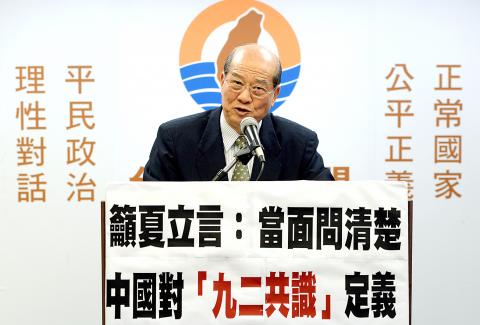The Mainland Affairs Council (MAC) yesterday dismissed speculation that Beijing is planning to drastically cut the number of Chinese tourists visiting Taiwan by 95 percent in the run-up to the January elections.
Democratic Progressive Party Legislator Hsiao Bi-khim (蕭美琴) asked MAC Deputy Minister Lin Chu-chia (林祖嘉) at a legislative meeting about reports that the Beijing government is to reduce the number of Chinese tourists to Taiwan by 95 percent for a month between the middle of December and Jan. 16, when Taiwan holds its presidential and legislative elections.
She asked whether the government had come up with countermeasures to protect local tourism, especially in eastern Taiwan.

Photo: Lin Cheng-kung, Taipei Times
“There is no such thing,” Lin said, referring to the rumored cut.
Asked why such a rumor has been circulating, Lin said that Taiwanese elections are a politically sensitive issue in China, and Beijing has therefore cautioned Chinese “visitors and travel agencies to be careful when visiting.”
“So it is true that a small portion of people might be affected,” Lin said.
“Do you not think that [Chinese people] would rather be curious, contrary to the Chinese government’s warning, about the election in a pluralistic democratic society? After all, they do not have elections there,” Hsiao said.
“That is true, so visitors in general might want to come, but tour groups of professionals or of official exchanges might be affected,” Lin said, adding that he could not specify a number, but expects the figure to be small.
“Certainly not 95 percent,” he said.
Hsiao said the concern expressed by travel agencies is an indication of how tourism has become overly dependent on China.
Premier Mao Chi-kuo (毛治國) said the government has always been circumspect and kept the number of Chinese tourists at a certain level.
“The proportion [of Chinese visitors] is less than 40 percent right now,” he said.
MAC Minister Andrew Hsia (夏立言) said on Monday at a legislative committee meeting that he would inform his Chinese counterpart during a cross-strait meeting starting today that Taiwan’s elections are “normal and regular” events that should not be an excuse to bar Chinese tourists from visiting Taiwan.
Hsia added that he would ask Taiwan Affairs Office Minister Zhang Zhijun (張志軍) to clearly repudiate the rumor about the 95 percent reduction.
Hsia said the two sides would also exchange views on the overall development of cross-strait relations, and that the council hopes to maintain cross-strait peace and stability based on the so-called “1992 consensus.”
The “1992 consensus” refers to a tacit understanding reached during the cross-strait talks in 1992 that both Taiwan and China acknowledge that there is “one China,” with each side having its own interpretation of what that means.
Hsia and Zhang will also exchange views on the cross-strait trade in goods agreement, setting up respective representative offices in each other’s territories, signing an environmental protection agreement, the implementation of major agreements, and both sides taking part in regional economic integration.
Additional reporting by CNA

Alain Robert, known as the "French Spider-Man," praised Alex Honnold as exceptionally well-prepared after the US climber completed a free solo ascent of Taipei 101 yesterday. Robert said Honnold's ascent of the 508m-tall skyscraper in just more than one-and-a-half hours without using safety ropes or equipment was a remarkable achievement. "This is my life," he said in an interview conducted in French, adding that he liked the feeling of being "on the edge of danger." The 63-year-old Frenchman climbed Taipei 101 using ropes in December 2004, taking about four hours to reach the top. On a one-to-10 scale of difficulty, Robert said Taipei 101

Nipah virus infection is to be officially listed as a category 5 notifiable infectious disease in Taiwan in March, while clinical treatment guidelines are being formulated, the Centers for Disease Control (CDC) said yesterday. With Nipah infections being reported in other countries and considering its relatively high fatality rate, the centers on Jan. 16 announced that it would be listed as a notifiable infectious disease to bolster the nation’s systematic early warning system and increase public awareness, the CDC said. Bangladesh reported four fatal cases last year in separate districts, with three linked to raw date palm sap consumption, CDC Epidemic Intelligence

Taiwanese and US defense groups are collaborating to introduce deployable, semi-autonomous manufacturing systems for drones and components in a boost to the nation’s supply chain resilience. Taiwan’s G-Tech Optroelectronics Corp subsidiary GTOC and the US’ Aerkomm Inc on Friday announced an agreement with fellow US-based Firestorm Lab to adopt the latter’s xCell, a technology featuring 3D printers fitted in 6.1m container units. The systems enable aerial platforms and parts to be produced in high volumes from dispersed nodes capable of rapid redeployment, to minimize the risk of enemy strikes and to meet field requirements, they said. Firestorm chief technology officer Ian Muceus said

MORE FALL: An investigation into one of Xi’s key cronies, part of a broader ‘anti-corruption’ drive, indicates that he might have a deep distrust in the military, an expert said China’s latest military purge underscores systemic risks in its shift from collective leadership to sole rule under Chinese President Xi Jinping (習近平), and could disrupt its chain of command and military capabilities, a national security official said yesterday. If decisionmaking within the Chinese Communist Party has become “irrational” under one-man rule, the Taiwan Strait and the regional situation must be approached with extreme caution, given unforeseen risks, they added. The anonymous official made the remarks as China’s Central Military Commission Vice Chairman Zhang Youxia (張又俠) and Joint Staff Department Chief of Staff Liu Zhenli (劉振立) were reportedly being investigated for suspected “serious